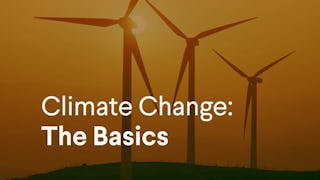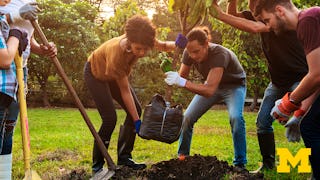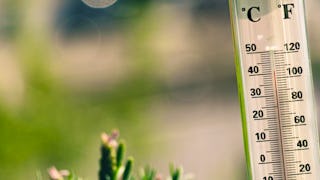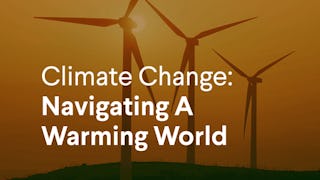Climate change is a global phenomenon, but its impacts vary among different social groups, who perceive and adapt to climate change impacts in different ways. In this course, you will:



Climate change and Indigenous People and local communities



Instructors: Victoria Reyes García
Access provided by NavGurukul Foundation
4,114 already enrolled
(55 reviews)
Skills you'll gain
- Social Sciences
- Environmental Science
- Governance
- Vulnerability
- Policty Analysis, Research, and Development
- Environment and Resource Management
- Environmental Policy
- Natural Resource Management
- Research Methodologies
- Sustainable Development
- Community Development
- Climate Change Mitigation
- Fundraising
- Climate Change Adaptation
- Cultural Sensitivity
- Data Collection
Details to know

Add to your LinkedIn profile
5 assignments
See how employees at top companies are mastering in-demand skills

There are 5 modules in this course
This course on Climate Changes Impacts and Indigenous People and Local communities (IPLC) is divided in five different sections:<br>1) the module 2 aims to present the key notions related to climate change, and to Indigenous peoples and local communities knowledge systems.<br>2) the module 3 will show the different climate changes impacts on IPLC, at the climatic, biological, physical and human systems level.<br>3) the module 4 presents examples of coping and adaptation strategies of IPLC to climate change impacts.<br>4) in the module 5, different methods for data collection on local perceptions of climate change will be presented<br>5) the module 6 aims to give an overview on the governance in global change and the role of IPLC.<br>Overall, this course includes a theoretical and a methodological component, through which you will learn methodologies to conduct research on Indigenous Peoples and local communities’ perceptions of climate change impacts.
What's included
8 videos14 readings1 assignment
In Module 3, we will explain the importance of understanding how climate change impacts Indigenous Peoples and local communities. IPLC are disproportionally impacted by climate change because they depend directly on the use and management of natural resources. We will also present some common approaches to assess the vulnerability of Indigenous Peoples and Local Communities to climate change impacts. Finally, this module will bring examples of how climate change impacts elements of the climatic, physical, biological and human systems, and how these impacts are perceived by Indigenous Peoples and local communities.
What's included
6 videos6 readings1 assignment
In Module 4, we describe coping and adaptive strategies that IPLC from around the word have used to respond to the impacts of climate change. After an introductory video, the module is structured around examples of the following IPLCs' responses: i) sharing and cooperation, ii) diversification, iii) exchange, iv) storage, v) forecasting, vi) rationing, vii) mobility.
What's included
8 videos10 readings1 assignment
In Module 5 we discuss IPLC contributions to climate change research and introduce a standardized methodological protocol to assess such contributions.
What's included
8 videos4 readings1 assignment
In Module 6, we discuss several reasons that describe the importance of bringing IPLC as legitimate actors in global climate policy. We also present current attempts to do so through examples from the literature and existing policy initiatives.
What's included
9 videos8 readings1 assignment
Instructors


Offered by
Why people choose Coursera for their career




Learner reviews
55 reviews
- 5 stars
60%
- 4 stars
30.90%
- 3 stars
7.27%
- 2 stars
0%
- 1 star
1.81%
Showing 3 of 55
Reviewed on Nov 15, 2024
This course provided a lot of real information about the realities of the lives of those considered inferior. Great information
Reviewed on Sep 7, 2023
very informative .it has changed my view about the climate change and local indigenous communities
Reviewed on Dec 3, 2021
I loved this course but i would say that the time associated with how long it would take to read all of the papers was very inaccurate. Thank you for this content though it was brilliant!
Explore more from Physical Science and Engineering

Council on Foreign Relations

University of Michigan

University of Colorado Boulder

Council on Foreign Relations



